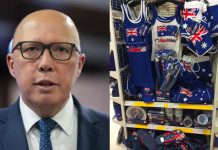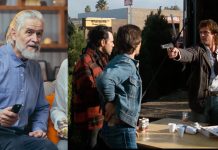

CLANCY OVERELL | Editor | CONTACT
In case you haven’t been across the news lately, Australia’s media pundits and political commentators are mortified by the Albanese Government’s decision to hold a national referendum over whether or not we should include Aboriginal people in the constitution.
There is also a great deal of skepticism surrounding the idea of providing Aboriginal community leaders with a platform to advise politicians on their unique socio-economic issues – and offer strategies that might help mitigate the very visible rates of disadvantage and near-third world suffering amongst Indigenous Australians.

While the concept of an Indigenous Voice does seem like an unprecedented approach to these issues – especially for our traditionally risk-adverse nation – the government has clearly indicated that this advisory body will not have any veto powers over Australian lawmaking or tradition, and will serve only as an ‘advisory body’.
So why does the media and conservative political class seem to be so furiously opposed to it.
It’s a real head scratcher, especially when considering that the Liberal Party and NewsCorp were some of the loudest champions of the Uluru Statement – which is the founding document that this referendum has been modelled off.
So let us explain why The Indigenous Voice is not a good thing.
With this debate now at a hysterical point where the misinformation is spreading like wildfire and racist slurs are being plastered all across social media, The Betoota Advocate has decided to cut through the culture wars – and present 5 fair and balanced reasons why the Indigenous Voice is a bad idea:
Please be aware that this article contains vivid references to the historic and traumatic mistreatment of Aboriginal people.
- A succesful referendum result will cause irreversible damage to our political landscape.
Not only would this chalk up an easy win for the Albanese Government – but it would also push the Australia we once knew into irrelevance. Are we really that eager to erase the legacy of Tony Abbott, Malcolm Turnbull and Scott Morrison by implementing such a big change within the first year of the Liberals losing office? A successful referendum will lead Australians to question the very point of us having the Liberal Party, or a National Party? Not to mention the newspapers who campaigned heavily for the re-election of Scott Morrison – do we really want to live in a world where our major media companies get it wrong all the time?
In order for us to keep the conservative political class in the picture – we need to give them an easy win.
The Opposition and the Murdoch media were once all for an Indigenous Voice – but only when they it looked like something they could claim as their own idea. Now things have changed. The referendum is now a chance for Dutton and Murdoch to get vengeance for last year’s humiliating election result. It’s a last ditch effort to delay the imminent identity crisis that threatens their very own existence. After losing 20 seats in 2022, they are going all in on reframing this referendum as ‘the silent majority finally speaking up’ and will celebrate their hollow victory like it’s ‘our Brexit moment’.
It’s even sweeter that they get to use black fellows as the punching bag in their efforts to chalk up a few political points.
- You can’t just keep changing things. It has to stop somewhere!
We all remember the gay marriage plebiscite. The ridiculous and hurtful experiment that humiliated both sides of the debate and tore families apart. Religious Australians were ridiculed for their beliefs, and the LGBTI community had their very existence put to a vote.
Luckily, the Indigenous Voice Referendum is nothing like the gay marriage plebiscite – mostly because our media is intent on only presenting us one side of the debate. Sure, we get to hear from Aboriginal people, but only three of them: Jacinta Price, Warren Mundine and Lydia Thorpe. Three very different people with one relatively similar position, which just so happens to be the same position shared by our major newspapers, mining companies and the Federal Opposition.
But the key difference between The Voice and the Gay Marriage plebiscite is that, in 2017, the gays had far more stake in Australian society than the disproportionately disadvantaged Indigenous people have ever had. There is no generational wealth being tipped into this referendum campaign. The Indigenous Voice campaign is run off pro-bono man hours and the smell of an oily rag in their battle against the conservative political establishment and Australia’s billionaire media families.
The fabulous and all-saturating Marriage Equality campaign was heavily-funded by the same pink dollar that was pouring in from the same corporations and organisations that turn our cities into a rainbow wonderland every February and every June. The best that The Indigenous Voice get is some novelty NRL jerseys and a few pamphlets.
In short, Alan Joyce gets his white wedding, but it’s best that the Aboriginals stay where they belong!
- Our government could receive conflicting advice?
An Indigenous Voice might mean that our politicians receive advice from people who aren’t the mining lobbyists and private prison corporations.
We can change our constitution all we want, but the real problem is when we change how things work in Canberra. There’s a very real threat that The Voice poises to the political class and their biggest donors. The voice in itself is nothing more than a system that provides Aboriginal people with their own lobbyists to advise our politicians on the efforts and laws that aim to minimise Indigenous disadvantage.
The fact that these Aboriginal people could be walking the same halls of Parliament with the very well paid mining and industrial prison complex lobbyists would scare the shit out of our governments corporate stakeholders, aka the billionaires that our politicians would traditionally take orders from. They do not want our politicians hearing conflicting advice. Imagine how inconvenient it would be if an elder managed to convince enough politicians to implement successful strategies to keep young men out of prison… what does that mean for the multinational corporation that’s halfway through building a new private prison in Perth? They might not have enough young blacks to fill it with.
4. The Indigenous Voice might mean we have to confront our own history?
As anyone who had the pleasure of being educated in a demountable Australian classroom would know, the accepted version of Australian history basically starts at the arrival of Captain Cook, fast forwards to the Gold Rush, fast forwards again to the beaches of Gallipoli, then fast forwards again to the Sydney Olympics.
That’s how we like our history. We don’t want to talk about the horrors of Cootamundra Girls Home. Or the gruesome massacres of open season. Australia’s education system, and our political system, is not in the business of confronting our own historical atrocities. Leave that to the Japanese and the Germans
One of the key missions of an Indigenous Voice is to confront the very real issues that stem from our government and the British government’s historic mistreatment of Aboriginal people. A hundred years of unhelpful, and in many circumstances, genocidal government policies have caused traumatic ripple affects that are still visible to this day. This all a bit uncomfortable isn’t it?
You might’ve heard about the Stolen Generation, but then again, you might’ve heard Andrew Bolt’s version – one that alleviates Australia of any real guilt and insists it was a good idea to kidnap an entire generation of children based on their race – strip them of their culture and leave them to be raised out of sight by abusive priests and pedophile dorm wardens in religious and government run institutions.
That’s why the NO Campaign is starting to get aggressive and peddle misinformation, it’s a way of filling that deep black hole of guilt and sadness that doesn’t have to exist if we militantly deny it. It’s far easier for the Australian psyche to tell ourselves lies about them getting billions of dollars of funding and free houses.
5. An Indigenous Advisory Body would put Australians out of work.
You hear a lot about the many thousands of bureaucrats employed in services roles aimed at helping improve the lives of Aboriginal people. You also hear a lot about how much money gets spent on these fruitless efforts. While a lot of this rhetoric is usually greatly exaggerated by racists, it would be a lie to suggest that public servants don’t have a reputation for bludging in this space.
We’ve all got one in the family. The blue-haired cousin who came back from the Territory with a skin name and photos of them hugging other peoples children on Instagram.
Well eventually, that blue-haired cousin becomes a policy advisor – and ends up joining a chain of communication that could include up to 5, 6 or 7 different white saviour bureaucrats that dilute the urgency and lived experiences that Aboriginal people are trying to convey to politicians.
By the time the issues from these communities make their way to Parliament they have been tweaked, banged up and bent out of shape by the resin-jewellery bleeding hearts that would be unemployable in any other sector.
What if someone told you that an Indigenous Voice could slash both of those things. Greatly reducing the amount of idealistic middle men from the equation, while also stemming the flow of public money aimed at keeping these bloated organisations afloat.
That’s what an Indigenous Advisory body would aim to achieve. Putting the elders in the same room with the decision makers. The same way agricultural bodies get access to Barnaby Joyce.
It would eliminate the need for a vast majority of the dead wood currently employed in the sector, and could very well see real and immediate results in community.
Wouldn’t that just be so typical of Albanese to gleefully put people out of work.
6. Maybe we don’t want things to change.
We’ve already outlined the historical horrors – we don’t need to delve into the inter-generational trauma, substance abuse and worse incarceration rates for Indigenous people than apartheid South Africa.
But is fixing these things what we really want. Like, even if it works. Do we want it to work? What happens to everyone else at the bottom of our class system if Aboriginal people find a path that works for them? Is Australian society solely dependent on us having someone to look down on? Or someone to hate? A resoundingly positive referendum result would mean we need to find a new bottom of the pile. And the next cab off the rank is the rural working class whites – aka bogans, or rednecks, or whatever our media and politicians calls them when they occasionally become a political inconvenience to the system. Does our government have to look after them too? What’s next? We have to solve the ice epidemic that is thriving in the very electorates that have wielded the most political power for the last ten years of government? We stop sending young men to die in pointless American wars? Will the National Party have to actually improve the lives of their most loyal voters? Will the Liberal Party have to actually listen to the National Party? We have to remove asbestos from the roofs of our public schools? We need to make sure there’s a doctor available to deliver babies west of the Great Dividing Range?
When you think about it, the Indigenous Voice could just be the start of landslide. Imagine a world where we have a government who gets into a habit of fixing things. Imagine a world where we have wage increases that actually match the cost of living? Imagine our government being forced to ensure Australians are entitled to affordable housing? Or affordable childcare? Imagine reliable public transport? Imagine a humane standard of aged care? This is not the direction we want to head in.
Just vote NO. Don’t touch anything. Don’t do a thing. Everything is fine.










